Rio Olympics and Beyond
Published on August 22nd, 2016
Andy Hunt, who was appointed as Chief Executive Officer of World Sailing in January, had a full schedule at the Rio 2016 Olympic Games. Scuttlebutt editor Craig Leweck caught up with Andy during the second week of competition for an update…
This is familiar territory for you.
Well, I was chef de mission and secretary general NOC of the British Olympic Committee from 2008. So I was rapidly involved in both preparing the British team to seize the opportunity of a home Olympic Games in 2012, but also in terms of the Vancouver 2010 Winter Games through London, and then of course now this opportunity through Rio.
Explain World Sailing’s involvement in the Olympic Games.
In terms of the international federation’s involvement, when host cities are bidding for Games, we go through a process of evaluating the venues that are proposed for the competition. So we’ve been involved before Rio got selected in 2009. I don’t know exactly when, but I imagine it was around 2007 when World Sailing (then ISAF) would have gotten involved.
Once the Games organizing committee is selected and nominated, then it is a case of moving into the operational planning. World Sailing then works very close with the organizing committee as they resource up the people, that they seize the opportunity of hosting the Games for the sport in their country. There’s a lot work making sure the national federation is making the most of the opportunity. And that can be for everything, such as training officials, and as Sailing had the opportunity of having two test events in 2014 and 2015, there was lots of opportunities to provide that development required before you get to the Olympic Games.
Then World Sailing works very close with the organizing committee to monitor all the plans and review all the plans that are taking place. So I’ve been here, I think, four times this year before the Games. We would sit for a number of days. We go for every functional area. And of course, probably the highest thing on the agenda was water quality. So we sat and worked with the city, with the environmental agency, with the mayor, with the federal government, just making sure they were always going to deliver to the plan they had. And the scrutiny is continued down to weekly calls to make sure that happened.
And that’s where things did get a little dicey in advance of the Games.
Yes, absolutely. The obligation to deliver all of that is with the city, with the organizing committee, and not with World Sailing. Our responsibility is to put the utmost pressure on them, and then working in close partnership with the IOC as well to put the pressure onto the organizing committee to make sure they achieve the commitments that they set out.
What becomes World Sailing’s role during the Olympics?
Well, we appoint the technical delegates. We appoint all the officials, jury, race management, etc. So we have been intimately involved in the delivery of the event, though we’re still very reliant on the organizing committee. The organizing committee still has to provide the venue. They have to operate the venue. They have to meet a lot of obligations – be it down to branding of boats and other things. We came out very early, probably now–nearly three weeks ago. And the reason we came so early was to make sure that the obligations that they had were going to be met, and if they weren’t going to be met, we have the capability to step in and actually assist them. So that’s some of what we’ve done.
What has kept you personally occupied?
Probably in the buildup and probably for the first three days, was just making sure I’m giving the best possible support to my technical delegates and the entire team in making sure that the operational delivery can get achieved. And I have worked with the IOC and the senior people in the organizing committee, again, just maintaining the pressure on so that we get the best possible experience for the sailors and for the coaches here at the Games.
There’s no question that this Games provides the most extraordinary backdrop, some incredible sailing conditions, albeit hugely unpredictable, and not what people expected. I’m not sure there’s been a lot of home advantage in sailing in Rio. But it’s that component. It’s also about working with all of our global stakeholders that find themselves at the Games, and the IOC, and other sporting bodies that are here, making sure that we use this opportunity of this incredible global gathering to bring as much influence sailing can.
And that isn’t just about the one-on-one, the meetings, the hosting that we’re doing here; it’s also about actually what we do with media too. Our role, I think, is to absolutely amplify what is being done by all of the other media outlets – broadcast, digital print journalism, social media. So our job is to really showcase our sport and amplify it so we create this fantastic virtual circle of interest to ultimately try and increase the fan base and participation of sport, and therefore over time provide a better commercial platform for the sport.
How much work is being done here for Tokyo 2020?
Quite a lot of work. The next Game’s organizing committee has a right to attend– I think there are 200 or 300 people from Japan here, not just in sailing; this is right across the board. So we’ve had and are having a number of meetings where a large delegation from Japan will come and observe what’s happening here.
We’re engaging on not only the operational components, but the whole image and experience we want to project for the sport going forward. As I’m saying, we’ve got a number of meetings. You can’t avoid that. It’s got to be done. This is a unique opportunity. Secondly, of course, we’re actually engaging with all the bidding cities for 2024 too. And again, it’s really important. We’ve had the CEO’s of the big committees. We’ve had mayors. We’ve had all kinds of people wanting to experience and see sailing.
Let’s discuss the television coverage. The production is controlled by Olympic Broadcast Services (OBS). What role does World Sailing have in television decisions?
The broadcast is down to OBS. Over the years, in advance, we influence the plan. But one interesting thing here has been because of pollution risk and because of wind conditions here, which are unpredictable, we always had to have outside ocean race areas.
You get out to the ocean, they’re huge seas. We’ve had racing in three-metre swells. The ocean race areas are on the other side of Sugarloaf and the other mountains. There were logistical and technical challenges to run live broadcast from those races, to have the full production crews operate in that environment, and having the relay points to transmit the footage. So it’s always been clear to everyone around the world that those race areas, where were created for good sports reasons, would never be on the live broadcast.
For live broadcast, two of the race areas inside Guanabara Bay were designated. However, the ocean racing, along with all the other race areas, would be recorded. The recorded footage goes out to the rights-holding broadcasters, but it’s up to sailing nations to put pressure on their rights-holding broadcasters to get that footage out. Everyone has it, but it’s not live.
I actually think OBS are doing a great job here with how they’re projecting our sport. We’re seeing here, with a combination of Swiss Timing, the kind of production which is much more akin to what we’re all seeing in the America’s Cup. We’re seeing a great blend of what you see down the lens combined with data to give the viewer an understanding of what the positions are at any one time. It makes the presentation of our sport much more interesting for the viewer.
Looking forward, do you remain excited about sailing’s position with the Olympics?
Completely. I mean, absolutely completely. I think our sport is developing well. I think that we need to always review to move forward, but we have this rare opportunity with our sport. It has the most amazing combination of harnessing nature and technology with bringing together some of the greatest athletes. We have the opportunity in our sport to really produce something incredibly special going forward.
However, that does mean we have to be open to change. It doesn’t mean throwing the baby out with the bathwater and the incredible tradition we have in our sport, but we have to keep moving forward. The Olympics as a product is at a turning point through the IOC’s Olympic Agenda 2020 – the strategic roadmap for the future of the Olympic Movement. And we have to move forward in that way, respect what the IOC has set out, to what they want to achieve with this event, this magical event, the Olympic Games. There’s nothing like it.
What does moving forward mean?
Currently, I don’t think all our events fully reflect the whole of our sport. Let’s not forget, the whole of our sport goes from boards and kites to moths to dinghies to keel boats to superyachts to America’s Cup to offshore around-the-world races. And my feeling is actually what we probably need to be doing over time is thinking about how the Olympic Games is the showcase for our entire sport end to end.
If I was a particular enthusiast around – I don’t know – offshore, I might just want to see the connection back to the Games what I’m seeing there. If I’m an enthusiast about the America’s Cup and the foiling world, actually I can see the connection back to what’s happening in the Games.
I believe the Olympic Games is absolutely the pinnacle of our sport, but it also needs to provide pathways. You need to naturally understand how sailors have got to connect from what they do here to what they might go on to do in the full spectrum of our sport.
Event details – Schedule – Scoreboard – Photos
Full disclosure: At the time of this interview, Craig was working for World Sailing. However, the questions asked were only his own.


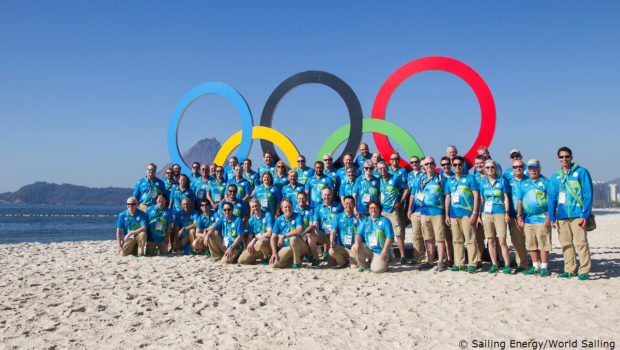
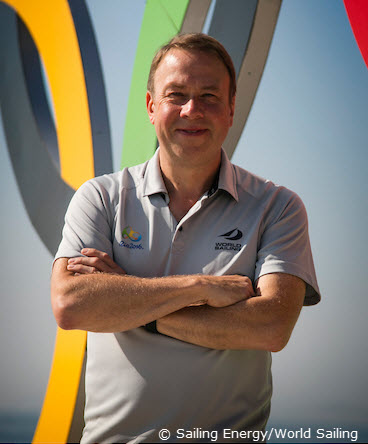


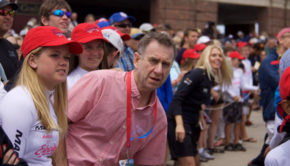
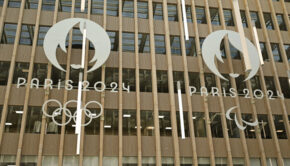
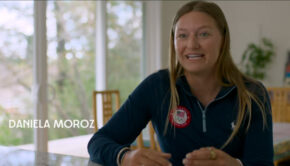
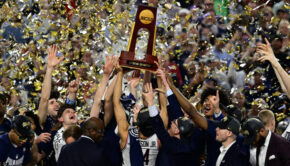
 We’ll keep your information safe.
We’ll keep your information safe.